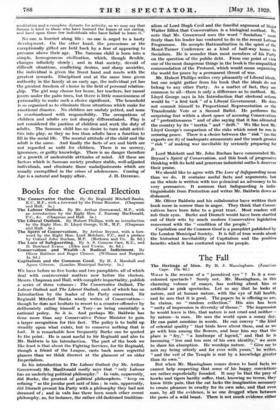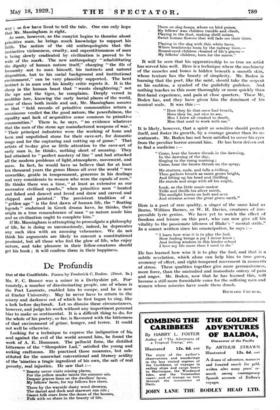The Fall
The Heritage of Man. By H. J. Massingham. (Jonathan Cape. 10s. 6d.) WHAT is the reverse of a "jaundiced eye " ? Is it a rose- coloured spectacle ? Surely not. Mr. Massingham, in this charming volume of essays, has nothing about him so artificial as pink spectacles. Let us say that he looks at nature, and at human nature, with the eye of full health, and he sees that it is good. The papers he is offering us are, he claims, no "random collection." His aim has been "unity of impression in diversity of theme." The impression he would leave is this, that nature is not cruel and neither— by nature—is man. He sees the world upon a sunny day. Ile can paint sunshine in words. He can convey "the kind of celestial quality" that birds have about them, and as we go• with him among the flowers, and hear him say that the place is "fey," "a landscape of legend," and that he is becoming "less and less sure of his own identity," we seem to share his absorption. He worships nature. "Give me to mix my being utterly and for ever with yours," he writes, "and the veil of the Temple is rent by a knowledge greater than its own."
But when Mr. Massingham comes down to hard facts we cannot help suspecting that some of his happy convictions are rather superficially founded. It may be that the prey of hawks and tigers hardly suffer, that, knowing no terror, they know little pain, that the cat lacks the imagination necessary to create pleasure in cruelty for its own sake, and that even man, by all the evidence, is as one drugged when between the paws of a wild beast. There is not much evidence either
way; so few have lived to tell the tale. One can only hope that Mr. Massingham is right-
As soon, however, as the essayist begins to theorize about primitive man, he brings much knowledge to support his faith. The notion of the old anthropologists that the . instinctive viciousness, cruelty, and superstitiousness of man is being slowly eradicated by civilization is proved to be wide of the mark. The new anthropology "rehabilitating the dignity of human nature itself," ehn.rging "the ills of humanity not to man himself, his instincts and natural disposition, but to his social background and institutional environment," can be very plausibly supported. The herd instinct is in man and his kindly critic regrets it. It is the sheep in the human beast that "wants slaughtering," not the ape and the tiger, he complains. Deeply versed in neolithic lore, knowing the early burial places of the world, some of them both inside and out, Mr. Massingham assures us that "field records of primitive communities return a unanimous verdict Nfos. the good nature, the peacefulness, the equality .and lack of acquisitive sense common to primitive communities." There is, he says, "no evidence whatever that the men of the stone age manufactured weapons of war." " Their principal industries were the working of bone and horn and unpolished stone for their cave-art, for domestic usage and for the capturing and cutting up of game." That artists of to-day give so little attention to the cave-art of early man is, he thinks, nothing short of amazing. They had attained to "perfect mastery of line" and had attacked all the modern problems of light,atmosphere, movement, and mass. In fact, he would have us believe that for at least ten thousand years the genus Homo all over the world "was unwarlike, gentle in temperament, generous in his dealings and very considerate to women who were the equals of men." He thinks there was a time, "at least as extensive as our successive civilized epochs," when primitive men "hunted and fished and danced and loved and drew and carved and chipped and painted." The persistent tradition of a "golden age" is the first dawn of human life, the "floating legends" enshrined in Greek drama have, he thinks, their origin in a true remembrance of man "as nature made him and as civilization ought to complete him."
If Mr. Massingham is attempting to promulgate a philosophy of fife, he is doing so unconsciously, indeed, he deprecates any such idea with an amusing vehemence. We do not think his arguments are likely to convert a constitutional pessimist, but all those who feel the glow of life, who enjoy nature, and take pleasure in their fellow-creatures should get his book ; it will confirm them in their happiness.













































 Previous page
Previous page